The Apple iOS 9 Review
by Brandon Chester on September 16, 2015 8:00 AM EST- Posted in
- Smartphones
- Apple
- Mobile
- Tablets
- iOS 9
Siri
Siri debuted with iOS 5 on the iPhone 4s, and at the time was really the first virtual assistant integrated into the core of a mobile OS. It has faced steady competition from Google Now and now from Microsoft's Cortana, and in my experience it seems that Google Now still holds an advantage as far as speed and accuracy goes. However, at WWDC 2015 Apple detailed a number of statistics relating to Siri, and showed how Siri is being improved in iOS 9. According to Apple, Siri serves over one billion requests every week, and has gotten 40% more accurate in the past year, with a word error rate of just 5%. Siri has also gotten 40% faster in the last year, and having tried using Siri again for the purposes of this review it does seem that it has improved in these respects.
iOS 9 focuses on making Siri more intelligent and proactive. Part of this just involves simple improvements, such as how conversions are now done natively instead of referencing Wolfram Alpha, which ends up being much faster. In other cases, the fact that Siri is more aware of context allows for new uses that weren't previously possible. You can see above how asking Siri to remind me to read an article created a reminder which would have an embedded link to the webpage I was reading when it reminds me after I arrive home. You can also use Siri to make specific searches, like looking for photos based on a time and location. However, the contextual awareness doesn't go near as far as Google Now on Tap which will be launching in Android M and will allow you to ask questions in natural language about the content you're viewing and get relevant answers.
Ultimately the local and front end improvements to Siri as a voice assistant are not enormous, and the real improvements are those that Apple continues to make on the back end to make Siri more accurate and responsive when you use it. Since these improvements have nothing to do with the timeline of iOS releases - a consequence of Siri being as much a service as it is an OS function - there's not much I can say about them beyond what Apple has said. However, Siri has been expanded in iOS 9, and has now taken over what was previously Spotlight Search. The new search screen and enhanced universal search on iOS are what I'll look at next.
Universal Search
iOS 3 brought Spotlight Search from OS X to the iPhone. It was a screen you could access by swiping to the left of your first home screen, and it allowed you to search for applications and a limited set of content on your device. With the iOS 7 redesign this screen was eliminated, and Spotlight was now something you accessed by swiping down on any home screen. iOS 9 changes things up, and in a case of what you might call indecision Apple has decided to put a search section both in the old Spotlight Search area, and the screen accessed by swiping down on a home screen. However, this new search section to the left of your home screens has a couple of new features which are worth mentioning.
In addition to having search, the new search screen displays suggestions from Siri for apps you may want to open or contacts you want to call or send a message to. My problem is that I don't understand the reasoning behind the suggestions that I'm being given. The contacts seem to be chosen well, but only because I only contact four or five people frequently. The apps just seem nonsensical. I am very sure that I have never opened the YouTube app at 12:30AM in my entire life. The news selections are also terribly irrelevant. That isn't to say that all the stories themselves are irrelevant, but considering the fact that the majority of my Apple News sources are technology related I would love to know why I have never ever seen a single technology article in this list.
As for the searching itself, that's where things improve. Search has been given the same upgrades as Siri, with support for making conversions. You can also do voice searches which is a long overdue addition. Searching for general terms is also greatly improved. For example, searching for Samsung gives me the Samsung website as a suggested site, news from Apple News, general results from Bing, apps from Samsung on the App Store, Samsung's Wikipedia page, contact suggestions from people at Samsung that I've sent emails to, and even more. This is honestly the level of depth that search should have had on iOS for a long time now, and it's great to finally have a reliable way to search for something on the device with only a simple search term.
With iOS 9 Apple is also providing a search API for developers, which will allow them to add their own applications to the sources that are searched through. This means that an app like Twitter could allow you to search for tweets that you favorited or retweeted using the built in iOS search bar, and Microsoft Office could show you a document based on your search for a phrase that is inside it.
Search is definitely an area where iOS has been lacking for a long time now, and the additions Apple is making in iOS 9 are welcomed but definitely overdue in many cases. I think being able to search through many applications is great, and the integration with Siri to provide results like contact suggestions can be very helpful. At the same time, I really think the screen to the left of the home screens is poorly thought out and not useful because you can access search itself from any home screen. I feel like there was an initiative at Apple to create some sort of competition for the Google Now card screen, but it really didn't turn out well.
iCloud Drive
This is more of a power user app, and it's put in the OS somewhat like an easter egg. Basically there's an application that lets you view, download, and open files stored in iCloud Drive. The UI is essentially just the iCloud Drive picker put into an app with some changes, and you can see it below.
There's really not much to say about the app. Everything is organized the same way iCloud Drive is in Finder on OS X and on the iCloud website. You can download files, move them to different folders, and open them or copy them to an application of your choosing. It's just something to make note of if you ever want to manage your drive from your iPhone or iPad.



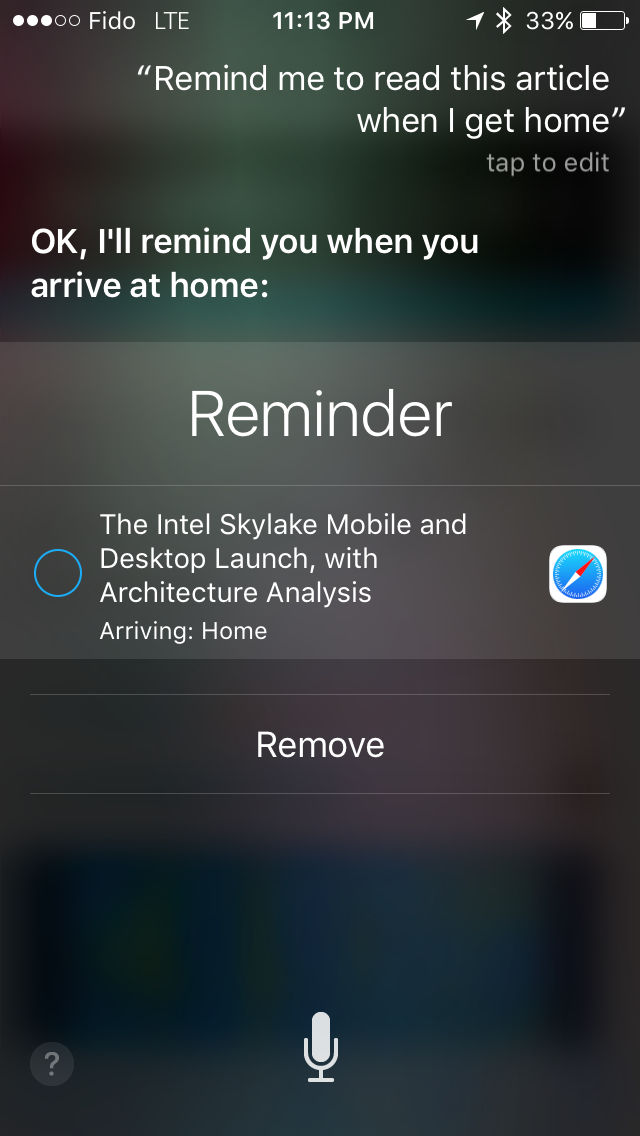
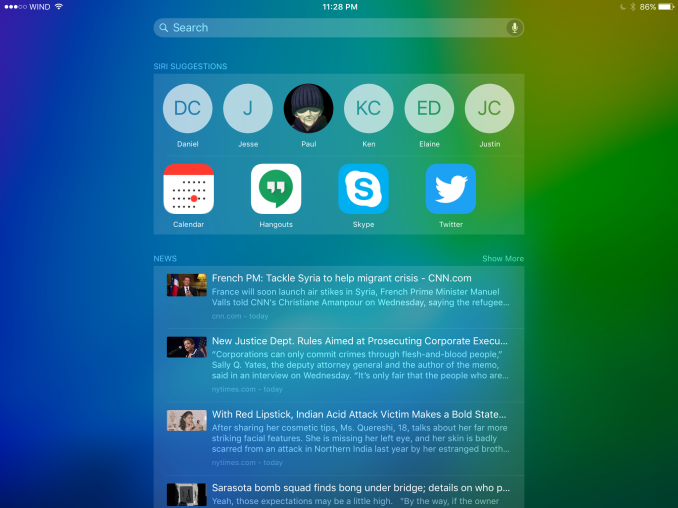
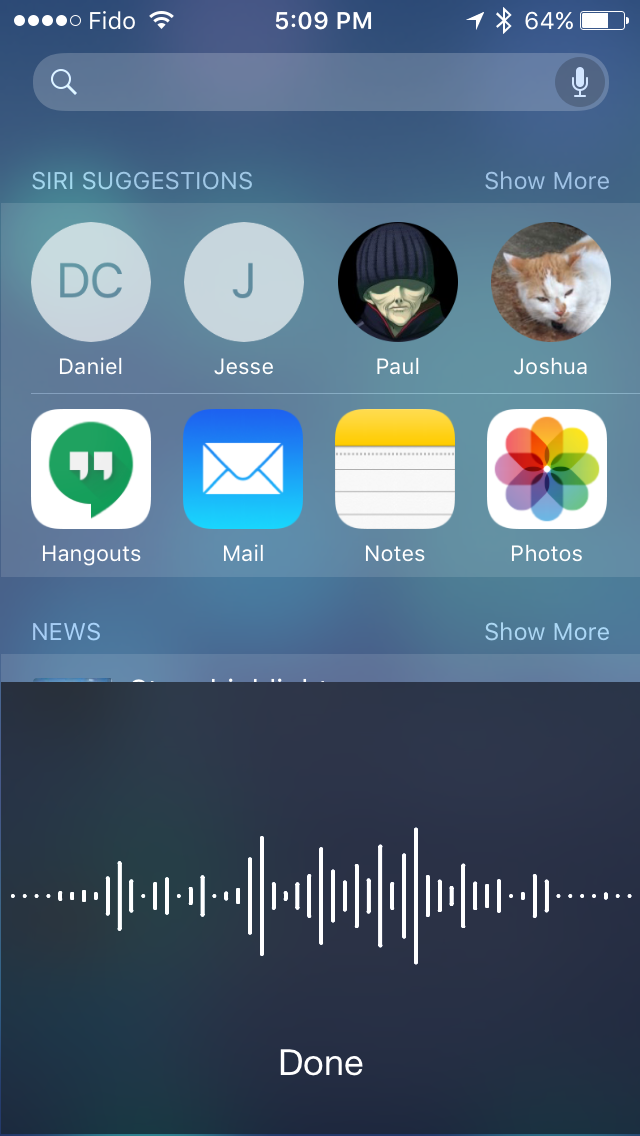
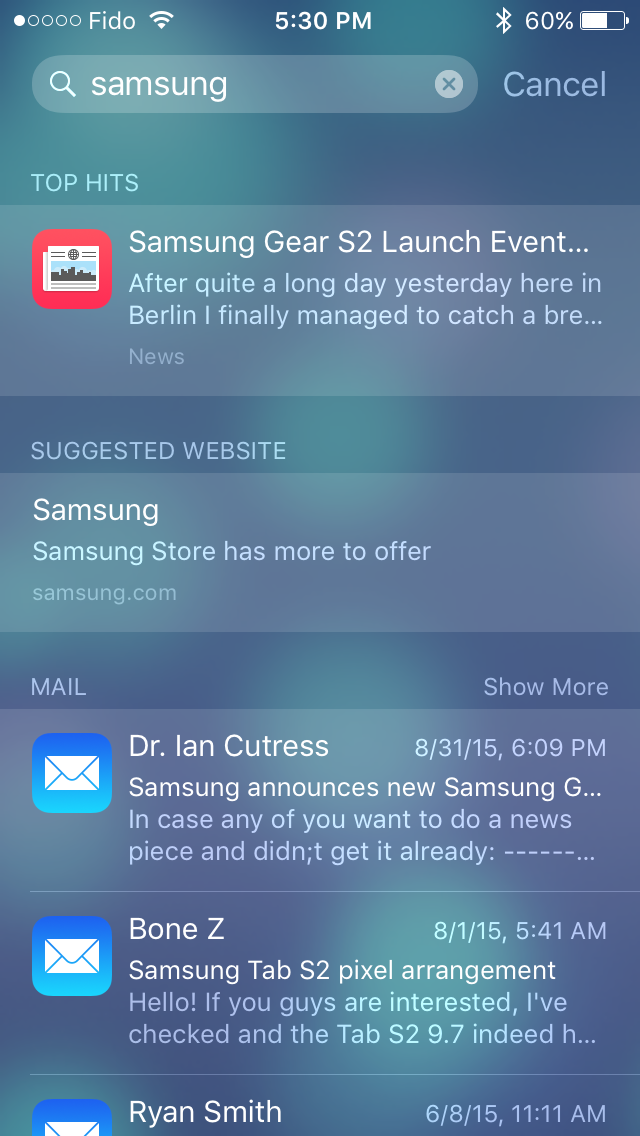
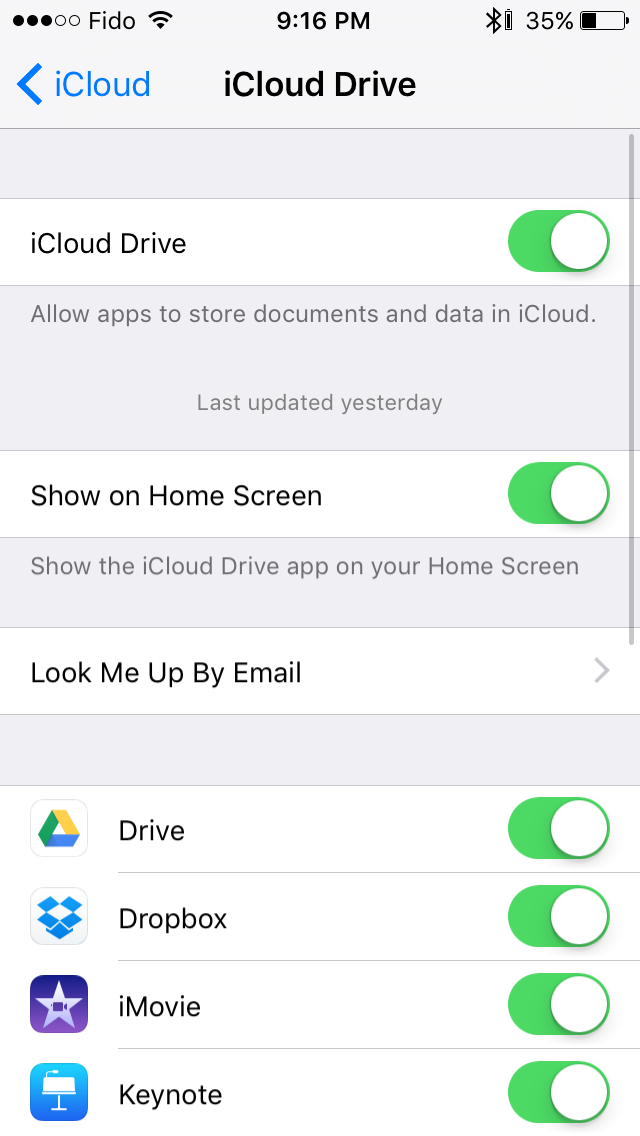
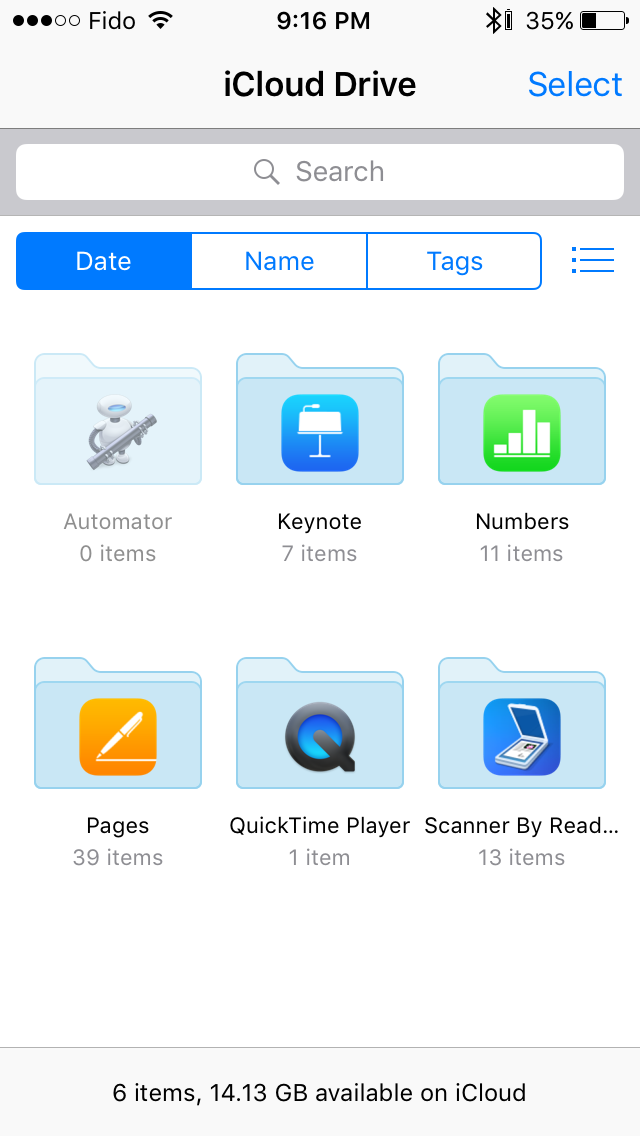








227 Comments
View All Comments
centhar - Thursday, September 17, 2015 - link
It's called a "toy" because all that "power" it has is relegated the iPad to just being a consumption device. The OS is not developed enough to make it a serious creation tool.ws3 - Friday, September 18, 2015 - link
"The OS is not developed enough to make it a serious creation tool."That is not true at all. There is no OS-dependent reason why an equivalent pretty much any desktop software could not run on a high end iPad like the iPad Pro. Desktop applications themselves do not rely on the user having full access to the file system. Of course user interaction would have to be redone to compensate for the lack of a mouse, but the power and OS services required to get the work done are there.
centhar - Friday, September 18, 2015 - link
One issue here, the lack of a file system. It makes organization, copying, managing, importing and exporting of data impossible in iOS. Which is needed for apps to function for the user like their desktop bretheren.ws3 - Saturday, September 19, 2015 - link
There is a file system, of course. But it is not exposed to the user.Apple's idea is that manual organization of the file system is an obsolete concept for most users. iOS apps allow you to import and export files without having direct file system access. Of course, due to the lack of direct file system access, the user has much less control over exactly how his files are organized, and must rely upon app-internal organization and cloud services to manage files.
The claim being made by Apple haters is that full user access to the file system is absolutely necessary. The claim being made by Apple is that full user access to the file system is more complexity than most users need or are able to handle, and that in the long run it will be seen as no more necessary than the manual layout of data in main memory -- something that was seen as critically important in the early days of computing, but which now, of course, is completely irrelevant to everyone except people writing operating systems.
It remains to be seen who is correct. I suspect Apple is, but we'll have to wait a while to find out.
osxandwindows - Sunday, September 20, 2015 - link
How about file managers for iOS, I use them all the timeSc0rp - Wednesday, September 30, 2015 - link
Why is it that people were creating stuff on primitive operating systems back in the 90's with far less power available than the iPad, yet for some reason you think that the iPad's os isn't developed enough and it can't be used for productivity. This is someone that used to use Mac OS7/8/9 back in the day and did a lot of producing on those systems, which were limited to cooperative multitasking.osxandwindows - Wednesday, September 16, 2015 - link
Well I don't have to buy a new device every 3 yearswylie102 - Monday, September 21, 2015 - link
"The Apple people are stupid sheep who can't think for themselves, and I hate to break it to you, but Apple consumers are a very small market compared to the overall PC and tablet market."A sheep is someone who follows the crowd, yet you state in your next sentence that the crowd is overwhelmingly using windows.
So which is it? You can't have it both ways.
robinthakur - Thursday, October 1, 2015 - link
I use a MS Surface Pro 3 and own an iPad Air 2 and I think the gap has narrowed in terms of what the ipad can't do (especially with a keyboard like the optional surface pro 3 keyboard) now that MS Office Web Apps run on them which is 90% of what the majority of working people need it to do. Now, obviously the Surface can do far more as a full blown Windows machine, and the software for it generally exists already. I as a power user and developer enjoy having that much control of full Windows and I need it. However it also has the historic disadvantages of running full windows which made people stop using it i.e. overheating, updates, security problems etc and complexity. For the average user who has been using an iPad in meetings for the last 5 years, Surface as an option really wasn't good enough as it was underpowered, battery poor, too small and too expensive. They have now changed to work with iPad and are used to working around some of the limitations and adapting their workflows.The reality is that the majority of users can get by with an iPad running a modern iOS with the appropriate apps unless they are doing something specialised like Visio, Photoshop or Maya or whatever. Speaking to the influencers and people with the power in business to change this through my job, the general consensus is that while they do like the Surface 3, and can see why having mobile Windows devices operating with a Windows enterprise stack makes things like SharePoint, and other enterprise MS software a much easier proposition, the reality is that MS has also made all it's software far more iPad friendly because the frightening alternative was people moving away from using software that didn't work on the iPad completely. We have zero choice on making software compatible with iPad because that's what people are using, period, and this can't change overnight. Apple has not properly targeted the corporate market other than maiking the devices basically compatible with things like VPN, Active Sync etc. because they haven't had any competition, but it wouldn't surprise me if they started taking it a bit more seriously.
I think MS don't help themselves by changing their minds and approach constantly on things like RT, Windows Apps and others. Businesses are only now starting to gain confidence that they are serious about the Surface program, and who is to say they won't decide to can it next year if the iPad Pro is a success and they want to focus on software and farm it out to Dell/Hp etc?
So nobody doubts that the Surface Pro 3 is a more capable device because it just is, but is it an appropriate device in an App centric world where most enterprise software can be delivered through a thin, light, cool-running iPad with Mobile Safari as a tier 1 browser via Office 365?
lilmoe - Wednesday, September 16, 2015 - link
"most Apple users would never dream of changing ecosystems"Opinions.... Most have no brand loyalty whatsoever, and will move to the newer "best thing" as claimed by their peers in a heartbeat.
iPads are great consumption devices, even I was suckered into buying one because my dad wanted one (his friend told him it was the best....."rolling eyes"). They are successful in part because of the devices themselves (and the brand), but that's not the major reason why. The more important reason is the *lack* of proper/legitimate competition in the iPad's target market.
Tablets running mobile OSs are NOT a necessity in peoples lives. They're more like a novelty some of us buy for "convenience", and are easily replaced by phablets for most consumers. Those who want one, and are willing to pay, will find the iPad very appealing for its performance, smoothness, and selection of media consumption and companion apps. It's a proven product in that respect, and those who're paying the premium don't want to deal with "other issues".
Android has had lots of trouble getting its performance and framerate game together. Google, and it's utter failure to deliver is at fault. Samsung is NOT a software company, and no matter how good and feature rich their modifications to Android are, lots of people will still find them "clunky" because these modifications were never native to the OS. Google's recent versions of Android are too little, too late. While stock Android is now fast and smooth, it still doesn't stand a chance against Touchwiz in neither features nor usability. Let me say this straight for those who think Touchwix is bad; the absolute majority of consumers HATE stock Android with a passion (tech blogs and XDA are NOT the majority of consumers, not by a long shot). Let me say one more thing if that wasn't offensive enough for stock Android lovers: While I personally believe Android is the king of smartphones (for now), it is the very reason why the non-iPad tablet market is so bad, confusing, cheap, and has no future.
Windows RT (now Windows 10 Mobile, without the desktop) was the absolute best mobile OS ever to be installed on an ARM powered tablet IMHO. But it had a mix of management, timing and media conception problems (and sabotage), resulting in the alienation of both users and devs.
Microsoft are really late to the consumer game, so late it's painful. They shouldn't have settled for firing Sinofsky, and everyone else behind how Windows 8/RT was executed, they should make sure they never find a career in tech.
The Surface Pro is very successful and popular because its intended audience know exactly how capable it is. These guys don't need extensive advertising.
True, it's Android (or rather more accurately, Samsung) on smartphones that forced Apple to reconsider lots of their design decisions with their iPhones. But it's Windows that's forcing them to change the face of iOS on their iPads.
There are 3 major markets for tablets:
1) consumers (dominated by Apple)
2) prosumers (spread among Apple and Microsoft, with some Android users here and there)
3) professionals and content creators (dominated by Microsoft).
Apple's latest updates to iOS and the iPad are primarily for maintaining the second type. Because the first type couldn't give a rat's behind how a productive a tablet is.